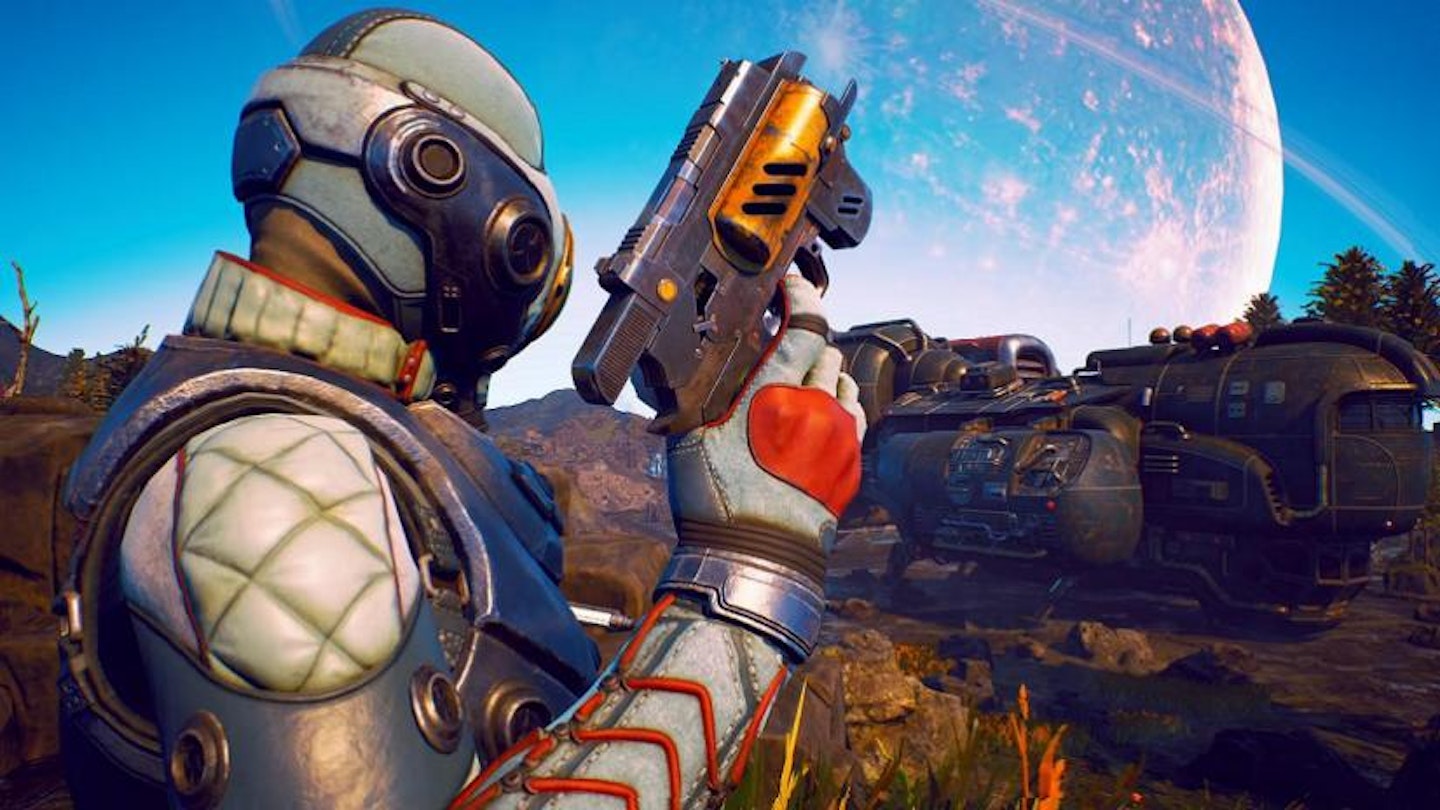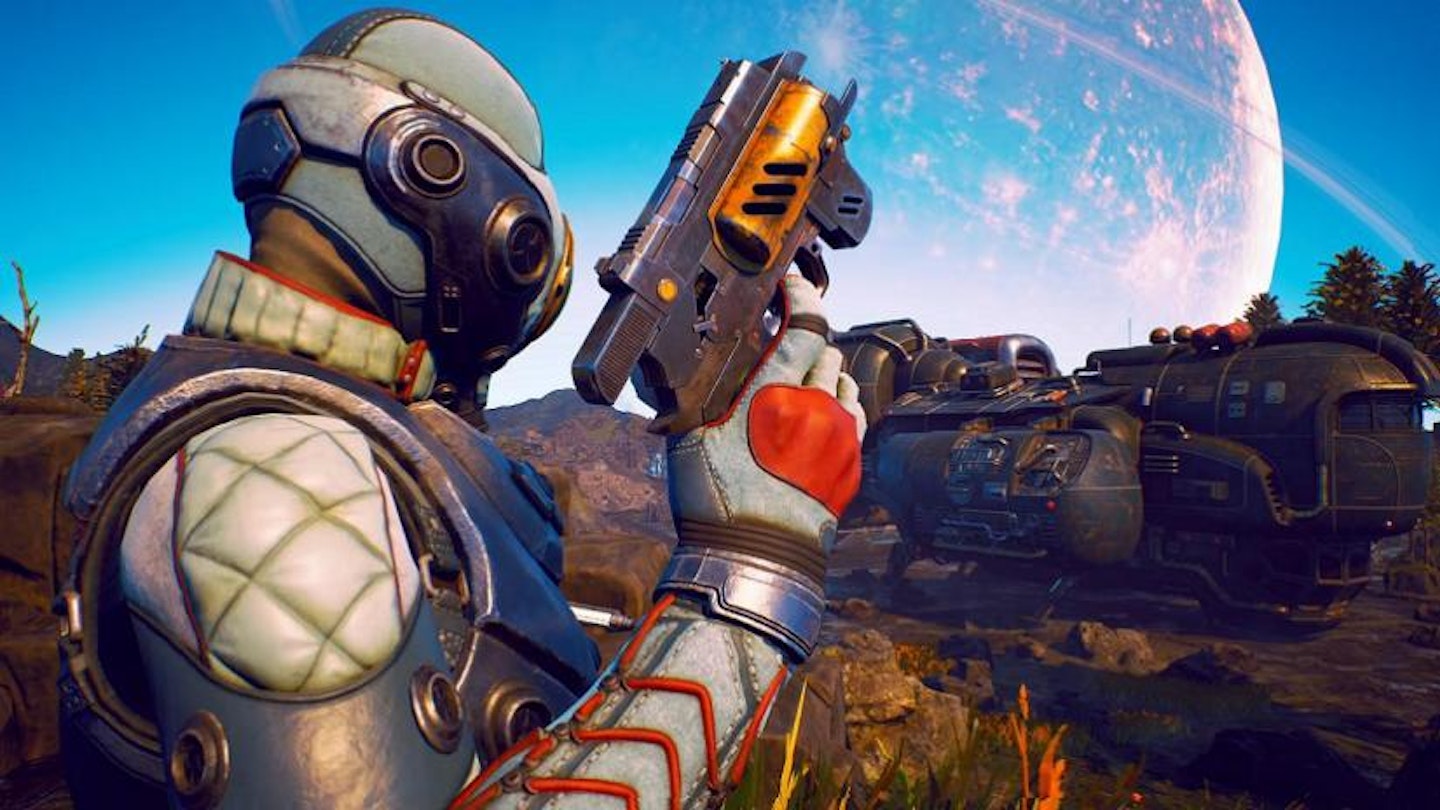It's no surprise that The Outer Worlds can best be summed up as "Fallout... in Space!" – developer Obsidian Entertainment has made a name for itself as an RPG developer of fine repute, including the fan-favourite spin-off Fallout: New Vegas. Yet while the DNA of that game, plus dashes of Star Wars: Knights of the Old Republic II and Obsidian's other works are clear to see, remixing it with a retro-futuristic tone and aesthetic that wouldn't be amiss in Futurama gives it a unique flair.
Set centuries into the future – an alternate one though, the timeline diverging from our own in the early 1900s – The Outer Worlds imagines you as a revived colonist, reawakened after your cryostasis ship was lost for decades, abandoned in the void of space by the cruel corporate overlords that lured people to the new world.
Brought back to life by the eccentric Professor Phineas Vernon Welles – a not-too-subtle hint at the prototypical sci-fi that influences much of the game – you'll first design exactly what sort of colonist you were. Character creation is complex and nuanced enough for fans of the genre, but intuitive enough for neophytes to role-playing, explaining clearly what every skill or attribute choice does, but rather brilliantly allows for a wide variety of personality types determined by stats. Lower your intelligence, for instance, and you'll unlock frequently hilarious "dumb" dialogue options when speaking to NPCs, while maxmising leadership can turn you into a veritable Starfleet captain commanding the loyalty of companions you'll gather later.
It's when you set foot on the surface that the game really starts to shine, though, presenting one of the most beautiful and visually inventive games in years. Weird, bold colours, strange flora and fauna, and unfamiliar skies are mixed with grimy homesteads, corporate squalor, and deliberately clunky mechanical design reflecting the almost steampunk inspiration, and the result is a unique and exciting world.
One of the most beautiful and visually inventive games in years.
The Outer Worlds is quite mercurial in the kind of game it presents too. If you want to build your character into a lone-wolf gunslinger armed to the teeth and loaded up with nigh-impenetrable armour, it can feel like a shooter. If you want to focus on winning over the optional companions, it morphs into more of a tactical experience. Stack everything into stealth and hacking, and you might find yourself playing something more like Metal Gear Solid. Obsidian has built a very versatile system, and while combat feels a direct lift of Fallout – there's even a VATS-style slow-motion technique to better target enemy vulnerabilities – how you engage with it offers up a good amount of flexibility.
Quite what you do in the world is pleasantly freeform, too. Beyond an initial impetus to find a spaceship – which becomes a mobile hub for resting,crafting and storing items – you're soon left to your own devices. You may want to work towards bringing down the corrupt corporate regime that dominates this corner of the galaxy, capitulate to their CEOs and become part of the machine, or anything inbetween.
The choices aren't cut and dried though – at every stage, quests throw up morally questionable conundrums. Do you steal medicine for a possibly hypochondriac man, or give it to a shady group that might – might – distribute it to more people in need? Do you kill a friendly robot wandering a junkyard, or repair it, not knowing if warnings of an automaton uprising are paranoia or not? Nothing is clear, and the people giving you the quests are just as opaque, their motivations and backgrounds often obscured.

This is as much of a negative as a positive though – constantly analysing inscrutable figures becomes tiresome after a while. Quest chains themselves are, almost from the very beginning, frustratingly long too – sometimes, you just want a "go here, kill this" side mission to play on the quick, without it opening up an hours-long moral quagmire that determines the fate of an entire city. There's no real balance of experience in The Outer Worlds – everything has Very Important Consequences.
For anyone disappointed in the direction Fallout itself took with the online Fallout 76, Obsidian's strange new world may be exactly what they've been looking for. Although its retro SF stylings barely hide its influences, The Outer Worlds offers enough originality – and certainly enough spectacle – to stand alone
